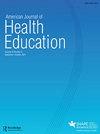青年人的感知体重和体重管理相关行为:体重指数的中介作用
IF 0.8
Q4 PUBLIC, ENVIRONMENTAL & OCCUPATIONAL HEALTH
引用次数: 1
摘要
摘要背景了解感知体重、体重指数(BMI)和体重管理相关行为之间的关系对于预防年轻人肥胖至关重要。目的探讨年轻人感知体重与体重管理相关行为之间的关系,并评估BMI在感知体重与重量管理相关行为间的中介作用。方法采用来自全国青少年至成人健康纵向研究的4882例数据,采用多元线性回归和一系列中介分析对数据进行分析。结果总体参与者的感知体重和BMI均与早餐消费和睡眠显著相关(p<.001;p<.001)。年轻女性成年人的感知体重与BMI与早餐消费显著相关(p<.001);年轻男性成年人的感知重量和BMI与睡眠显着相关(p=.03)被发现介导了感知体重和早餐消费之间的关系。讨论研究表明,感知体重和BMI都有助于某些与体重管理相关的行为。BMI可能是健康行为改变的炎症机制。转化为健康教育实践需要为年轻人制定量身定制的干预措施或文化上合适的体重管理教育计划。这项研究的结果可能会对公共卫生教育产生影响。AJHE自学测验通过SHAPE美国在线研究所(SAOI)在线为本文提供http://portal.shapeamerica.org/trn-Webinars本文章由计算机程序翻译,如有差异,请以英文原文为准。
Perceived Body Weight and Weight Management-Related Behaviors among Young Adults: Mediating Effects of Body Mass Index
ABSTRACT Background Understanding the relationship between the perceived body weight, body mass index (BMI), and weight management-related behaviors is critical to preventing obesity in young adults. Purpose To explore the relationship between perceived body weight and weight management-related behaviors and to assess the mediating effects of BMI between perceived body weight and weight management-related behaviors among young adults. Methods Using data (n = 4882) from the National Longitudinal Study of Adolescent to Adult Health, multiple linear regression and a series of mediation analyses were applied to analyze the data. Results Both perceived body weight and BMI were significantly associated with breakfast consumption and sleep for overall participants (p < .001; p < .001). Perceived body weight and BMI were significantly associated with breakfast consumption among young female adults (p < .001). Perceived body weight and BMI were significantly associated with sleep among young male adults (p = .03). BMI is found to mediate the relationship between perceived body weight and breakfast consumption. Discussion The study demonstrated both perceived body weight and BMI contribute to certain weight management-related behaviors. BMI could be the inflammatory mechanism of health behavior change. Translation to Health Education Practice Development of tailored interventions or culturally appropriate weight management educational programs are needed for young adults. Findings of this study could have implications for public health education. A AJHE Self-Study quiz is online for this article via the SHAPE America Online Institute (SAOI) http://portal.shapeamerica.org/trn-Webinars
求助全文
通过发布文献求助,成功后即可免费获取论文全文。
去求助
来源期刊

American Journal of Health Education
PUBLIC, ENVIRONMENTAL & OCCUPATIONAL HEALTH-
CiteScore
1.70
自引率
10.00%
发文量
36
期刊介绍:
AJHE is sponsored by the American Association for Health Education of the American Alliance for Health, Physical Education, Recreation and Dance. The mission of the American Association for Health Education(AAHE) is to advance the profession by serving health educators and others who strive to promote the health of all people through education and other systematic strategies.AAHE addresses the following priorities •Develop and promulgate standards, resources and services regarding health education to professionals and non-professionals •Foster the development of national research priorities in health education and promotion. Provide mechanisms for the translation and interaction between theory, research and practice.
 求助内容:
求助内容: 应助结果提醒方式:
应助结果提醒方式:


